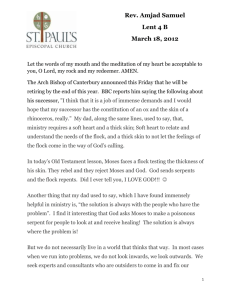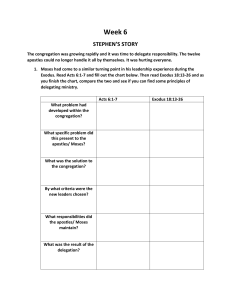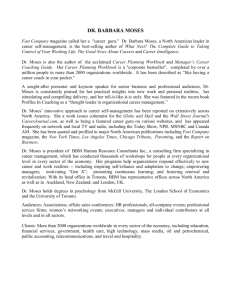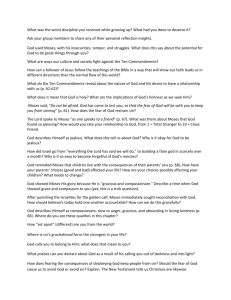Systematic Expository Study of God`s Word 19/08/2013 Study 11
advertisement
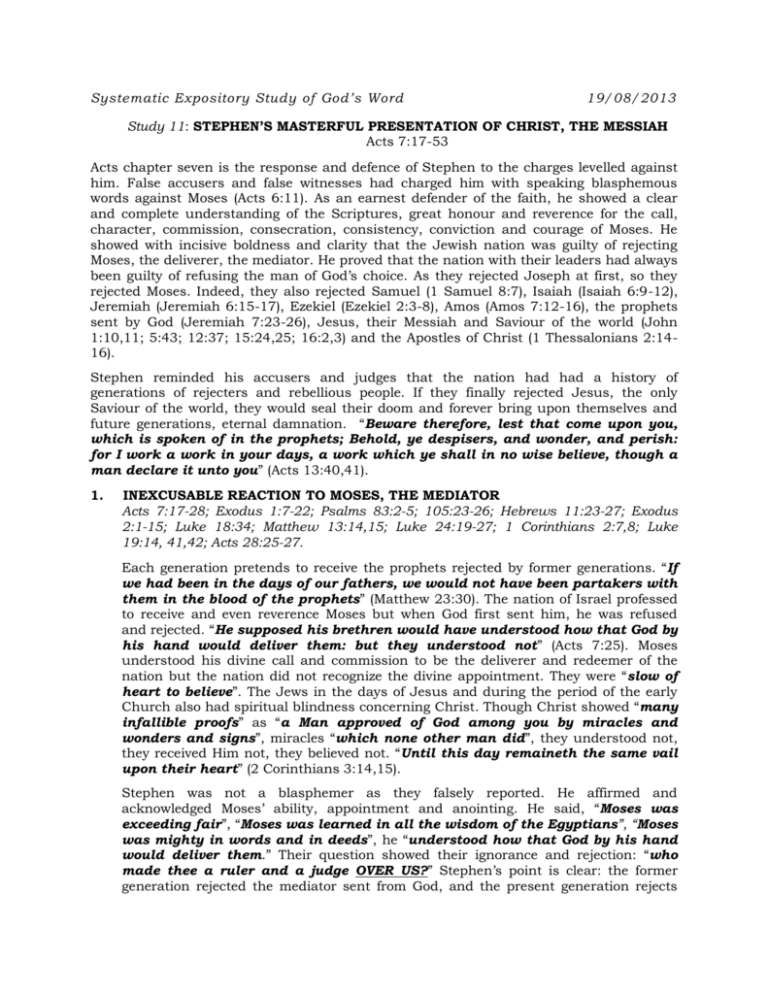
Systematic Expository Study of God’s Word 19/08/2013 Study 11: STEPHEN’S MASTERFUL PRESENTATION OF CHRIST, THE MESSIAH Acts 7:17-53 Acts chapter seven is the response and defence of Stephen to the charges levelled against him. False accusers and false witnesses had charged him with speaking blasphemous words against Moses (Acts 6:11). As an earnest defender of the faith, he showed a clear and complete understanding of the Scriptures, great honour and reverence for the call, character, commission, consecration, consistency, conviction and courage of Moses. He showed with incisive boldness and clarity that the Jewish nation was guilty of rejecting Moses, the deliverer, the mediator. He proved that the nation with their leaders had always been guilty of refusing the man of God’s choice. As they rejected Joseph at first, so they rejected Moses. Indeed, they also rejected Samuel (1 Samuel 8:7), Isaiah (Isaiah 6:9-12), Jeremiah (Jeremiah 6:15-17), Ezekiel (Ezekiel 2:3-8), Amos (Amos 7:12-16), the prophets sent by God (Jeremiah 7:23-26), Jesus, their Messiah and Saviour of the world (John 1:10,11; 5:43; 12:37; 15:24,25; 16:2,3) and the Apostles of Christ (1 Thessalonians 2:1416). Stephen reminded his accusers and judges that the nation had had a history of generations of rejecters and rebellious people. If they finally rejected Jesus, the only Saviour of the world, they would seal their doom and forever bring upon themselves and future generations, eternal damnation. “Beware therefore, lest that come upon you, which is spoken of in the prophets; Behold, ye despisers, and wonder, and perish: for I work a work in your days, a work which ye shall in no wise believe, though a man declare it unto you” (Acts 13:40,41). 1. INEXCUSABLE REACTION TO MOSES, THE MEDIATOR Acts 7:17-28; Exodus 1:7-22; Psalms 83:2-5; 105:23-26; Hebrews 11:23-27; Exodus 2:1-15; Luke 18:34; Matthew 13:14,15; Luke 24:19-27; 1 Corinthians 2:7,8; Luke 19:14, 41,42; Acts 28:25-27. Each generation pretends to receive the prophets rejected by former generations. “If we had been in the days of our fathers, we would not have been partakers with them in the blood of the prophets” (Matthew 23:30). The nation of Israel professed to receive and even reverence Moses but when God first sent him, he was refused and rejected. “He supposed his brethren would have understood how that God by his hand would deliver them: but they understood not” (Acts 7:25). Moses understood his divine call and commission to be the deliverer and redeemer of the nation but the nation did not recognize the divine appointment. They were “slow of heart to believe”. The Jews in the days of Jesus and during the period of the early Church also had spiritual blindness concerning Christ. Though Christ showed “many infallible proofs” as “a Man approved of God among you by miracles and wonders and signs”, miracles “which none other man did”, they understood not, they received Him not, they believed not. “Until this day remaineth the same vail upon their heart” (2 Corinthians 3:14,15). Stephen was not a blasphemer as they falsely reported. He affirmed and acknowledged Moses’ ability, appointment and anointing. He said, “Moses was exceeding fair”, “Moses was learned in all the wisdom of the Egyptians”, “Moses was mighty in words and in deeds”, he “understood how that God by his hand would deliver them.” Their question showed their ignorance and rejection: “who made thee a ruler and a judge OVER US?” Stephen’s point is clear: the former generation rejected the mediator sent from God, and the present generation rejects the Mediator (1 Timothy 2:5,6) approved, appointed, anointed and sent by God. Israel was guilty of rebellion and rejection. Are you guilty of rejecting Christ as your Mediator, Saviour, Deliverer and Lord? 2. IRREFUTABLE REVELATION OF THE MESSIAH THROUGH MOSES Acts 7: 29-37; Exodus 3:1-10; Mark 12:26,27; Exodus 3:10,14,15; Isaiah 63:11,12; Hosea 12:13; Psalm 118:22,23; Deuteronomy 18:15-19; Acts 2:22-24,36; 3:22-26; Matthew 17:1-5; 2 Peter 1:16-19. Without any shadow of doubt, Moses was a towering figure in Israel. Miraculously protected and preserved in childhood, appointed and approved by God, endowed with power to do signs and wonders, equipped and sent by God to be the nation’s leader, deliverer, prophet, redeemer and saviour, we see his impact and influence throughout the divine revelation from Exodus to Revelation. He was set apart and sent by God; yet, Israel rejected Him. Their rejection did not change God’s appointment. “This Moses whom they refused, saying, Who made thee a ruler and a judge? the same did God send to be a ruler and a deliverer” (Acts 7:35). The argument of the Jews who rejected Jesus is that if He had been sent by God as the Messiah, Saviour and Lord, the leaders in the nation would have recognized Him. Stephen recounted their history and revealed the perpetual blindness of Israel and her leaders. At his first appearance, they did not recognize Moses; at His first revelation to Israel, the nation did not recognise our Lord and Saviour, Jesus Christ. Yet, “they are without excuse.” “This is that Moses, which said unto the children of Israel, A Prophet shall the Lord your God raise up unto you of your brethren, like unto me; Him shall ye hear” (Acts 7:37). Some people in Israel recognised Jesus as the fulfilment of this prophecy. “Then those men, when they had seen the miracle that Jesus did, said, This is of a truth THAT PROPHET that should come into the world (John 6:14). The leaders had no excuse, their blindness was self-imposed so they could preserve their dead tradition. The common people asked, “Do the rulers know indeed that this is the very Christ?” (John 7:26). The nation and the leaders were without any excuse; their rebellion and rejection would lead to eternal damnation. 3. INCESSANT REBELLION AGAINST THE MANDATE OF THE MOST HIGH Acts 7:38-53; Exodus 32:1-10; 31-33; Nehemiah 9:26,29,30; Isaiah 1:2-18; Jeremiah 7:22-28; Ezekiel 20:6-13; Romans 1:21-32; 2 Chronicles 6:18; Isaiah 66:1,2; Jeremiah 4:3,4; Ezekiel 18:30-32; Hosea 10:12. False witnesses had risen against Stephen, vehemently saying, “This man ceaseth not to speak blasphemous words against this holy place, and the law” (Acts 6:13). Stephen cleared himself of the charge by referring to the law as “the lively oracles” given “unto us” (Acts 7:38). He said he believed that “our fathers” “received the law by the disposition of angels” (Acts 7:53). Concerning “this holy place”, the temple, the place of worship which almost became the object of worship, he recited what Solomon had said and revealed what God, Himself, had said. “Howbeit the most High dwelleth not in temples made with hands; as saith the prophet” (Acts 7:48). God, Himself, said, “Heaven is My Throne, and earth is My footstool: what house will ye build Me? Saith the Lord: or what is the place of My rest?” (Acts 7:49). These accusers and witnesses were hypocrites. Like the Pharisees during the earthly ministry of Jesus, and like generations of religious hypocrites since the time of Moses, they had habitually broken the laws they were defending. From the time of Moses, “our fathers would not obey”, and “in their hearts turned back again into Egypt” (Acts 7:39). The Jews, addressed by Stephen, were “stiffnecked and uncircumcised in heart and ears”; these persecutors had “received the law by the disposition of angels, and HAVE NOT KEPT IT” (Acts 7:51-53). Their fanatical zeal for “this holy place” was shallow, empty and deceptive. Their sinful, hypocritical lives rendered their worship unacceptable. “When ye come to appear before me, who hath required this at your hand, to tread my courts?” (Isaiah 1:12). “Will ye steal, murder, and commit adultery, and swear falsely; and come and stand before me in this house, which is called by My Name, and say, We are delivered to do all these abominations?” (Jeremiah 7:9,10). Religion which does not lead to repentance, righteousness and practical holiness is worthless in the sight of God. Such religion, even if it is called Christianity, will damn the soul in the eternal lake of fire. Repent and believe on the Lord, Jesus Christ. He is the only One who can forgive your sins, save your soul, transform your life, keep you holy and ready for heaven. * * * * * * * Congregational Song: ALMOST PERSUADED 1. “Almost persuaded:” now to believe; “Almost persuaded:” Christ to receive; Seems now some soul to say, “Go, Spirit, go Thy way: Some more convenient day On Thee I’ll call.’’ 2. “Almost persuaded:” come, come today! “Almost persuaded:” turn not away! Jesus invites you here, Angels are lingering near, Prayers rise from heart so dear, O wanderer, come! 3. “Almost persuaded:’’ harvest is past! “Almost persuaded:’’ doom comes at last! “Almost’’ cannot avail; “Almost’’ is but to fail: Sad, sad, that bitter wail “Almost’’ - but lost!



